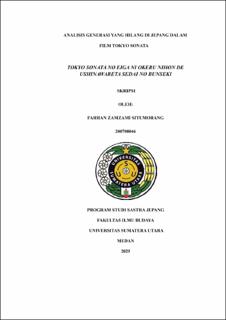Analisis Generasi yang Hilang di Jepang dalam Film Tokyo Sonata
Analysis of the Lost Generation in Japan in the Film Tokyo Sonata

Date
2025Author
Situmorang, Farhan Zamzami
Advisor(s)
Alimansyar
Arfianty, Rani
Metadata
Show full item recordAbstract
This research aims to analyze the representation of the Lost Generation (Ushinawareta Sedai) in Japan trough Kiyoshi Kurosawa’s film Tokyo Sonata (2008). The Lost Generation refers to the workforce impacted by the 1990s economic crisis, facing job insecurity, social stigma, and the disintegration of family value. Using a qualitative method with narrative delivery through film analysis, this research reveals the portrayal of the Lost Generation’s life and its impact on family dynamics. Using Goffman’s social sociology theory and Soemardjan’s social impact theory, the study uncovers the life conditions of the Lost Generation and the breakdown of family values. The results indicate that the film depicts psychological pressure, social fragmentation, and the collapse of traditional roles through visual and narrative symbolism. The conclusion highlights this generation’s unpreparedness to adapt to new realities as well as critique of the rigid Japanese work system, which tightly binds identity to employment status, and the fragility of patriarchal family values that fail to adapt in times of crisis.
Collections
- Undergraduate Theses [605]
